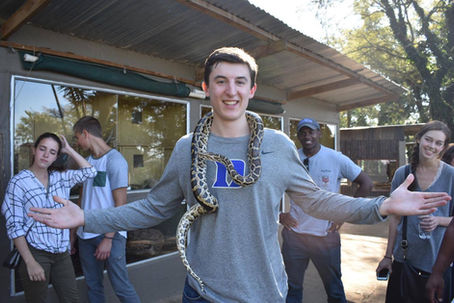I'm Different
- Owen Zighelboim
- Jun 19, 2017
- 3 min read

You’d think that I’d make it farther than the airport before I had to pay myself out of trouble. But I wasn’t in South Africa for five minutes before a nice man zeroed in on my confused expressions and offered to lead me to the connecting gate. How friendly everyone is here, yeah? With the gate in sight, he suggested, “I did some good for you, now you do some good for me.” Ah… it makes sense now! I promptly opened my wallet and coughed up my only bill, leaving me wondering what he was going to do with all that money.
All at once, it came into focus: I’m in a foreign country, I’m American, I’m stupid, and now I’m down 20 dollars. This, ladies and gentlemen, was my first introduction to my two-month stay in Durban, South Africa with DukeEngage.
I’ve had a lot of questions coming into this summer, and at the top of the list is the one that every traveler faces when going abroad: what will people think when they see me? Of course, we’re always going to want to communicate what we truly believe about ourselves. I’m a student. I’m here to learn. I want to understand this place better. I’m a friend. I’m here to help. I’m here to listen. I respect the locals whose space I’m entering. I care about others. I’m open to new ideas. I can be useful. I want to bring positive change, both within myself and the community I work. I want to be considered equal like every human should be. I’m practically an angel (if you can’t tell already). So why would other people think otherwise?
As it turns out, living in South Africa poses numerous challenges for people like me. I seem to pass off the whole American white boy look quite well, which opens the door to many misconceptions that locals have about me. I work at Assegai Primary School, where on my first day, I was greeted by the young “learners” with shouts of excitement and questions about whether I knew Lil Wayne or drove a Bugatti. Unfortunately, both are still on my bucket list. When I step into a classroom to help with a lesson, I can almost feel the glare of curious eyes following me around. Every so often, like when we’re out on the soccer field or hanging out during break, I get the rare chance to show them that we’re not all that different. But I know that many of them just see me as an owner of an Xbox. The teachers with whom I work have been extremely welcoming and seem excited to collaborate during these coming weeks, but often I wonder if my imposing presence and unseasoned teaching skills are only adding to the overwhelming laundry list of issues they must address each day.
To the students, I’m an icon. To the teachers, I’m a nuisance. To the porter, I’m a target. But to all them, I’m different. And if the color of my skin doesn’t warrant this difference, persistent inequality and the legacies of apartheid certainly do. I could definitely think of more fun ways to spend my summer than having to reconcile structural racism with the probing looks I get at a grocery store, right?
Since I arrived in Durban two weeks ago, I’ve certainly become more aware of my differences and my presence as an outsider, and I’m not the only one. Anybody aspiring to help knows that it’s a tough pill to swallow, especially considering the weight of the opportunity we have to grow as students and as people. But let’s be honest with ourselves – it takes those experiences that I’ve had – that I’m continuing to have – of discomfort, awkwardness, and occasional exploitation to expose us to the reality of our differences. Especially here in South Africa, differences have dominated peoples’ lives and continue to plague the development of this promising country. But if the end of apartheid is any indication, I’m hopeful about what’s to come during my time here. I’m stoked to haggle vendors at markets, to indulge myself in the curries and meats that rep the local palate, and to meet some amazing people with equally amazing stories. Looking back on it, I’m almost glad I got swindled by that porter. I just wish I got a discount.






Comments